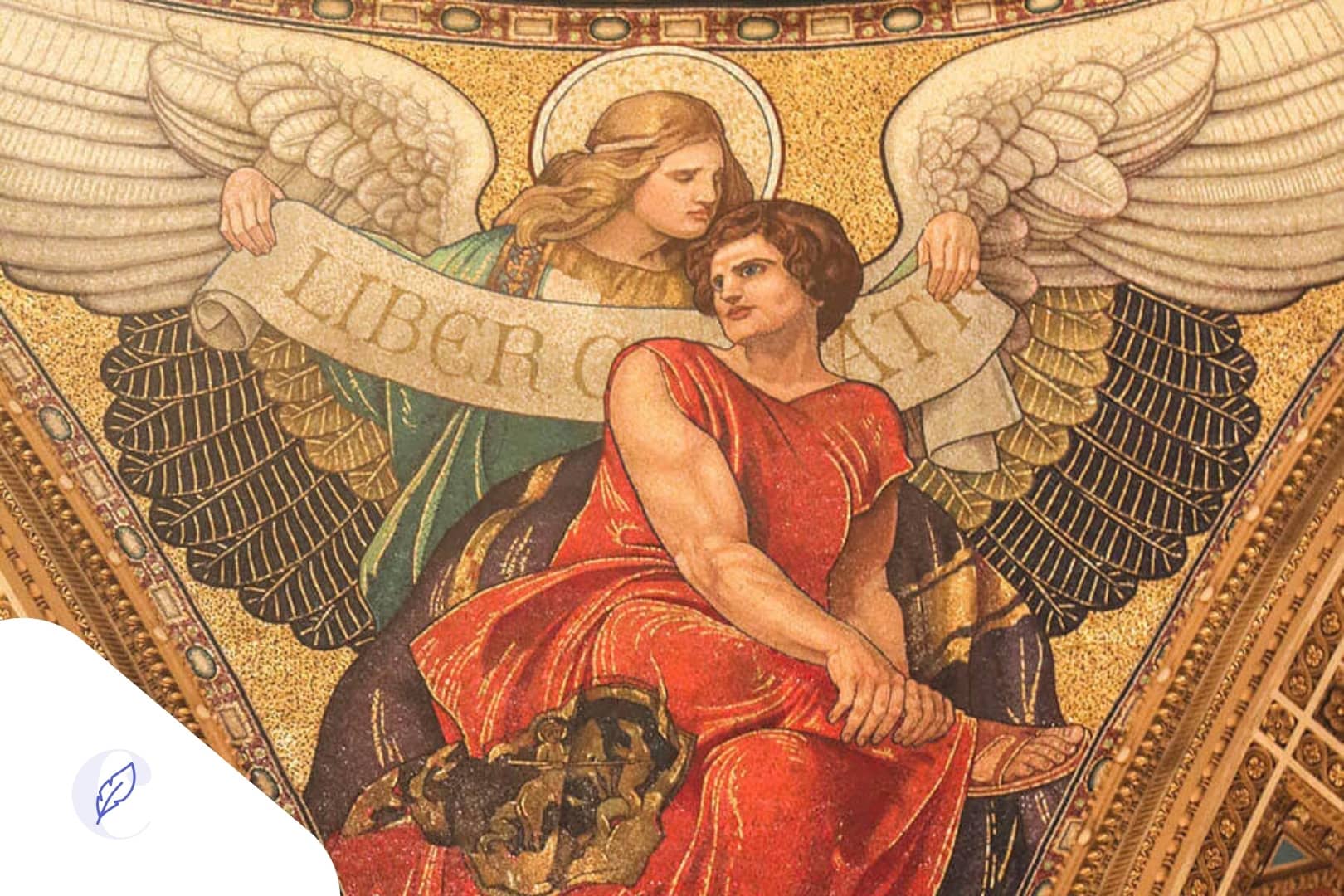In researching for my free ebook, ‘How to be a Catholic Author: A Mental Reboot for the Modern Fiction Writer‘, I scraped together a riveting roundup of articles, and scoured them for quotes.
I think that every Catholic author should know about these articles, be familiar with them, and bolster their visions for creativity on this bedrock of vision and opinions on the relationship between Faith and fiction.
I’ve gathered here all the quotes that inspired me. As you’ll see with the Flannery o’Connor sections, I almost just re-pasted the entire article, because every line is worth remembering.
So, enjoy! I’ll try to keep adding to this list as I find more good stuff over time.
And check out the the ebook, and let me know what you think.
On Fairy Stories
J. R. R. Tolkien
Fantasy, a Natural Human Activity
“Fantasy is a natural human activity. It certainly does not destroy or even insult Reason; and it does not either blunt the appetite for, nor obscure the perception of, scientific verity.”
The Escape of the Prisoner
“Why should a man be scorned if, finding himself in prison, he tries to get out and go home? Or if, when he cannot do so, he thinks and talks about other topics than jailers and prison-walls? The world outside has not become less real because the prisoner cannot see it. In using escape in this way the critics …are confusing, not always by sincere error, the Escape of the Prisoner with the Flight of the Deserter.”
Hallowed Legends
“The Evangelium has not abrogated legends; it has hallowed them, especially the “happy ending.””
Dangers to the Soul
A conversation with Piers Paul Read
On the difficulty in finding work as a novelist:
Hard to Make a Living
“It is the authors of what publishers call “middle-market fiction” who struggle to make a living. With so many means of distraction and entertainment today—film, television, social media, etc.—the young writer of good novels is unlikely to make a living from his craft.”
No more Homilies
“In today’s secular culture, any reference to a divine intervention in human affairs is problematic. Readers do not want a homily, let alone a work of Catholic apologetics.”
What’s Wrong with Contemporary Catholic Fiction?
Michelle Tholen, November 18, 2014
Daring to Challenge
“With few exceptions, not since Catholic fiction’s heyday in the mid-20th century have there been works of prose that would pique the interest of the critical and discerning Catholic reader. With fondness and longing are the likes of Walker Percy, Flannery O’Connor, Georges Bernanos, and G. K. Chesterton remembered. They entertained their readers, while at the same time daring to challenge them and stir within them a desire for something beyond themselves. They and their contemporaries imparted into their writing that element which, I believe, is missing in Catholic fiction today—a sense of the sacred.”
Our ‘Sense’ of the Mystical
“The “sense” has a sacramental quality to it. It makes God present to us in an almost mystical way. In literature it presents itself as an understanding that ordinary words on a page hold some more relevant and deeper meaning than they typically do, something that calls the mind to contemplation of higher things—to God. Through setting, character, theme, and other elements of a story, we encounter the Creator and experience some form of union with him.”
Life in All Its Reality
“Many of the great writers of Catholic fiction neither used Catholic characters nor told of overtly Catholic events—they “simply” wrote about life in all its reality.”
‘Catholic’ Fiction
Comment: “The problem with contemporary fiction from Catholic writers is that they are writing “Catholic” fiction. Writers, artists, and the like need to stop trying to insert Catholic themes into their work, and focus first on writing good stories, and making good art.”
Catholic Writing Today
True Works of Art
“The arts can come to our rescue, if they are true and beautiful and faithful to the moral order of the universe. In presenting human dramas in all their variety, a novelist, for example, can help reveal the actions of divine providence (very present but usually mysterious and hidden from our eyes). In this way a reader or a person listening to a symphony or gazing at a good painting can come to know that he is more than he thinks he is, more than the definitions of man given by ideologues and theorists. A true work of art helps him apprehend, by some interior sense, that while Man is damaged he is not destroyed; he is beautiful and beloved by his Father Creator.”
Good & Excellence
“Creators and critics need to remind themselves that the crucial question is the good or excellence of the work of art. And we must be very good in these times, if we hope to speak to the modern imagination and evoke awareness of the inexhaustible beauty of mankind and the universe, and of the metaphysical.”
Tolkien and the Evangelical Power of Beauty
John Carswell, October 17, 2014
Dark Stories
“…we need to be tellers of dark stories, for we live in a dark and sorrowful world. Now I’m certainly not arguing against the place of light and happiness. After all, we proclaim a great story where redemption is the ultimate reality. Yet if we neglect the place of darkness, sin, and evil in our stories, the weight of human moral action, the tragedy of the Fall, if any of these things are missing from our stories, we are failing in our art.”
Confessions of a Catholic Novelist
William Giraldi, June 21, 2015
An Empyreal Genius
“O’Connor remains the ideal illustration of how a Catholic who tells stories does not ipso facto become a Catholic storyteller. Again and again one is staggered by her alien abilities, her empyreal genius couched in that local strut through dirt and blood, her faith always hidden, even when she’s most vociferously expressing it. The fiction writer wears no vestments, and in her best stories and two novels, this is how O’Connor excels, as a kind of anti-preacher of her quaking faith. Not only does her writer’s hand never partake of piety and homily, but it is outright raking in its criticism of indoctrination, of inherited formulations and blind believing, of ovine and backwoods behavior. Catholics and Pentecostals, agnostics and atheists, the sacred and the profane alike scamper through her devil’s world, and she reserves her harshest reproof for those like the preacher and the babysitter in her story “The River”: the pharisaical and sanctimonious, those polluting proselytizers and vile converters.”
An Intrinsic Emergence
“The religious elements aren’t obnoxiously grafted onto the narrative but emerge intrinsically from the circumstances of the characters.”
Fiction & Answers
“Catholics already have the truth, whereas novelists write novels in part because they don’t. The Church has all the righteous answers; a novel is after the right questions. “We Catholics,” wrote O’Connor, “are very much given to the Instant Answer. Fiction doesn’t have any.” ”
A Catholic Agenda
“A novel should not be a tract, an apologia, dogmatism attached like strings to the limbs of characters; it should not seek to convert or persuade or indoctrinate. And when we tag a writer “a Catholic novelist,” we attribute to him the agenda of the Catholic, and not the aim of the novelist.”
A Dramatic Itch for Sin
“In his essay “The Holiness of the Ordinary,” Percy contends that “whatever else the benefits of the Catholic faith, it is of a particularly felicitous use to the novelist,” and I’d like to second that, too. It gives a writer that dramatic itch for sin, for judgment and damnation, for the rottenness of the world and the holy in us all.”
Catholic Novelists and Their Readers
True to His Nature
“No matter how much his character may be improved by the Church, if he is a novelist, he has to remain true to his nature as one. The Church should make the novelist a better novelist.”
Entranced with Christianity
“The Catholic novelist frequently becomes so entranced with his Christian state that he forgets his nature as a fiction writer. This is all right, this is fine, if he stops writing fiction, but most of the time he doesn’t stop writing it…”
A Talent for a Particular Thing
“A novelist is, first of all, a person who has been given a talent to do a particular thing.”
Leave Evangelizing
“The artist has his hands full and does his duty if he attends to his art. He can safely leave evangelizing to the evangelists.”
Be A Novelist
“The Catholic novelist doesn’t have to be a saint; he doesn’t even have to be a Catholic; he does, unfortunately, have to be a novelist.”
What a ‘Catholic Novel’ is
“If I had to say what a “Catholic novel” is, I could only say that it is one that represents reality adequately as we see it manifested in this world of things and human relationships.”
Comfortable Reading?
“Catholic life as seen by a Catholic doesn’t always make comfortable reading for Catholics…”
Poorly Written Novels
“Poorly written novels—no matter how pious and edifying the behavior of the characters—are not good in themselves and are therefore not really edifying.”
A Larger Universe
“The novelist is required to create the illusion of a whole world with believable people in it, and the chief difference between the novelist who is an orthodox Christian and the novelist who is merely a naturalist is that the Christian novelist lives in a larger universe. He believes that the natural world contains the supernatural. And this doesn’t mean that his obligation to portray the natural is less; it means it is greater.”
A Restraint on Creativity
“I have found that people outside the Church like to suppose that the Church acts as a restraint on the creativity of the Catholic writer and that she keeps him from reaching his full development.”
Pious Trash
“When the Catholic novelist closes his own eyes and tries to see with the eyes of the Church, the result is another addition to that large body of pious trash for which we have so long been famous.”
Forget about the Church
“The tensions of being a Catholic novelist are probably never balanced for the writer until the Church becomes so much a part of his personality that he can forget about her—in the same sense that when he writes, he forgets about himself.”
Catholic vs Modern Readers
“One of the most disheartening circumstances that the Catholic novelist has to contend with is that he has no large audience he can count on to understand his work. The general intelligent reader today is not a believer. He likes to read novels about priests and nuns because these persons are a curiosity to him, but he does not really understand the character motivated by faith. The Catholic reader, on the other hand, is so busy looking for something that fits his needs, and shows him in the best possible light, that he will find suspect anything that doesn’t serve such purposes.”
The Unthinking Catholic Reader
“The great mistake that the unthinking Catholic reader usually makes is to suppose that the Catholic writer is writing for him. Occasionally this may happen, but generally it is not happening today. Catholics brought up in sheltered Catholic communities with little or no intellectual contact with the modern world are apt to suppose that truth as Catholics know it is the order of the day except among the naturally perverse.”
Vision and Vice
“It is very possible that what is vision and truth to the writer is temptation and sin to the reader.”
Total Responsibility?
“This is no superficial problem for the conscientious novelist, and those who have felt it have felt it with agony. But I think that to force this kind of total responsibility on the novelist is to burden him with the business that belongs only to God.”
‘Positive Literature’
“The demand for positive literature, which we hear so frequently from Catholics, comes about possibly from weak faith and possibly also from this general inability to read; but I think it also comes about from the assumption that the devil plays the major role in the production of fiction.”
The Effort to Understand It
“There are those who maintain that you can’t demand anything of the reader. They say the reader knows nothing about art, and that if you are going to reach him, you have to be humble enough to descend to his level. This supposes either that the aim of art is to teach, which it is not, or that to create anything which is simply a good-in-itself is a waste of time. Art never responds to the wish to make it democratic; it is not for everybody; it is only for those who are willing to undergo the effort needed to understand it.”
The Church and the Fiction Writer
Flannery O’Connor, Mar 30 1957
Using Fiction to Prove the Faith
“It is generally supposed, and not least by Catholics, that the Catholic who writes fiction is out to use fiction to prove the truth of his faith or, at the least, to prove the existence of the supernatural.”
A Hostile Audience
“The Catholic who does not write for a limited circle of fellow Catholics will in all probability consider that since this is his vision, he is writing for a hostile audience, and he will be more than ever concerned to have his work stand on its own feet and be complete and self-sufficient and impregnable in its own right. When people have told me that because I am a Catholic, I cannot be an artist, I have had to reply, ruefully, that because I am a Catholic I cannot afford to be less than an artist.”
The Church vs the Novelist?
“The business of protecting souls from dangerous literature belongs properly to the church. All fiction, even when it satisfies the requirements of art, will not turn out to be suitable for everyone’s consumption, and if in some instance, the church sees fit to forbid the faithful to read a work without permission, the author, if he is a Catholic, will be thankful that the church is willing to perform this service for him. It means that he can limit himself to the demands of art.”
On Being a Catholic Writer
Serious Writers & Technique
“The transition from consumer of fiction to producer is a wrenching one. It is necessary to become quite analytical about what it is in the stories one enjoys that engages one’s interest and holds it. What is it that makes a story linger in the imagination after we have finished it? There are techniques to be learned. The difference between a serious writer and a dilettante lies in their contrasting attitudes toward technique. The dilettante writes to amuse himself, an easy task, but the serious writer seeks to interest a reader. Over my typewriter I pinned the legend: No one owes you a reading. It has to be earned. The old-fashioned way—with plot.”
Dante’s Vision of Human Action
“When Dante dedicated the Paradiso to Can Grande della Scala, he said that the literal meaning of the Divine Comedy is the way in which human beings by their own free acts earn eternal punishment or reward. That is the vision of human action that makes fiction Catholic. It is not a matter of having priests and nuns on the set, not a matter of explicit reference to Catholic things, but rather the Dantesque vision. There are priests and nuns in stories that lack this vision; this vision is present where there is nothing peculiarly Catholic in view.”
The Ultimate Stakes
“Embarrassment about the notion of the Catholic writer is like embarrassment at the notion of Catholic universities. The faith is seen as an embarrassment and an impediment. Both attitudes founder on the same fact. Universities were born ex corde ecclesiae, out of the heart of the Church, and so was our literature. Being a Catholic writer is not a falling away from an ideal; it is the way to fulfill the ideal completely—to see human acts in terms of the ultimate stakes of life. And to engage and amuse the reader in doing so.”
Header Photo CC Fr Lawrence Lew | Flickr




0 Comments